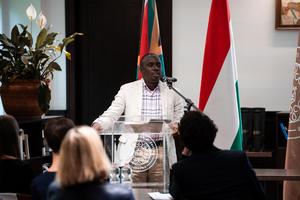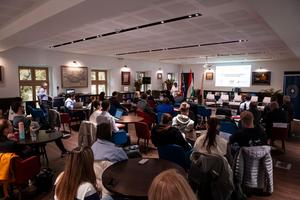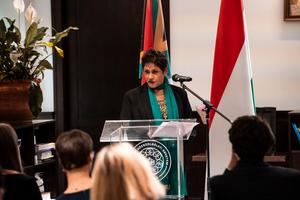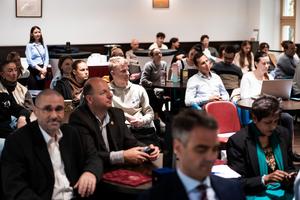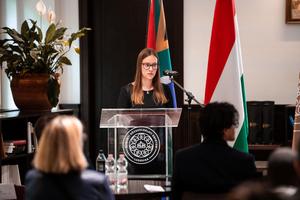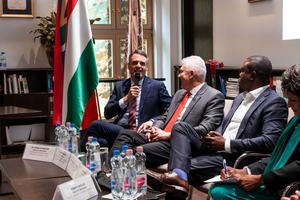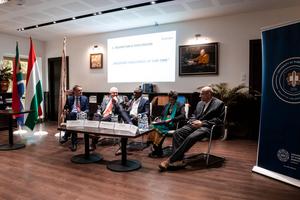The International Office of the Ludovika University of Public Service (LUPS) organized a conference on May 6 in the John Lukacs Lounge to mark the 10th anniversary of the university’s cooperation with South Africa.
György László Velkey, Head of the International Office at LUPS, reflected on the past 10 years, presenting the innovative relationship between South Africa and Hungary. He detailed collaborations with various institutions and highlighted the Erasmus+ International Credit Mobility (ICM) program, which has been highly fruitful between the two countries. He emphasized the shared challenges between South Africa and Hungary, such as climate change. Looking ahead, Velkey expressed a desire to open new chapters in cooperation beyond the Erasmus+ program, exploring areas that have not yet been addressed.
Professor Samuel Adelabu of the University of the Free State expressed his appreciation for the partnership between South Africa and Hungary in his speech. He stressed that the collaboration with LUPS has been highly beneficial for them, highlighting several advantages of the partnership, including joint publications, co-participation in conferences, preparatory work for international forums, and collaboration in the field of technology, alongside Erasmus+.
Maliga Reddy, lecturer at Durban University of Technology in South Africa, emphasized in her speech that this 10-year milestone is a celebration of a strong commitment to shared values, education, learning, research, and public service. “Over the past decade, we have witnessed the flourishing of rich and credible knowledge exchange covering various fields,” she noted. She mentioned disaster and risk management as an example of such collaborative areas.
Following the lectures, roundtable discussions took place. The first session addressed today's pressing global challenges with contributions from Ágoston Restás, Head of the Department of Fire Protection and Traffic Management at LUPS' Institute for Disaster Management; Roman Tandlich from Rhodes University in South Africa; Abiodun Ogundeji from the University of the Free State; and Maliga Reddy, moderated by Szabolcs Pásztor, Associate Professor at the Department of Economics and International Economics, LUPS Faculty of Public Governance and International Studies (FPGIS). The experts spoke in detail about climate change as a significant global issue, discussed South Africa’s economic challenges and resilience, particularly in relation to preparedness for the COVID-19 pandemic. The participants emphasized the importance of incorporating the perspectives of vulnerable communities into strategic planning processes. They compared Central Europe and South Africa, noting that both regions have been transitioning from totalitarian systems to democracy for the past thirty years. Finally, they highlighted the contradictions between equality measures and resilience approaches, emphasizing the opportunities for mutual learning between regions.
A second roundtable focused on the 21st-century challenges of leadership development, featuring Ágnes Jenei, Associate Professor at the Department of Social Communication (FPGIS); Péter Klotz, Assistant Professor at the Department of Human Resources (FPGIS); Johanes Belle from the University of the Free State; and Maliga Reddy. The discussion emphasized the necessity of cooperation with partners and the importance of learning. The conversation centered on key leadership competencies in the public sector in the 21st century. Innovation was highlighted as a critical leadership quality, especially in the face of unexpected challenges such as COVID-19, trade wars, and geopolitical conflicts. It was noted that innovation is fueled by diversity, while homogeneous organizations tend to be less creative. In addition, the significance of diversity management and intercultural communication—particularly in micro-societies—was emphasized, along with evidence-based decision-making and integrated approaches, using South Africa's efforts to professionalize its public service as a case study.
The event also acknowledged the contributions of Maliga Reddy, Samuel Adelabu, Abiodun Ogundeji, Johanes Belle, Roman Tandlich, and Ágoston Restás, among others.
Text: Éva Harangozó
Photo: Dénes Szilágyi
